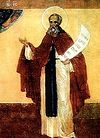

| Previous day | Next day |
| Old Style
February 13
|
Sunday |
New Style
February 26
|
| Cheese-fare Week—no meat; fish and dairy allowed. Cheese-fare (Forgiveness) Sunday. Tone 4. | Cheese-fare Week—no meat.
|
St. Seraphim (Sobolev), archbishop of Bogucharsk, Bulgaria (1950). ![]() St. Martinian, monk, of Caesarea in Palestine (5th c.), and Sts. Zoe of Bethlehem and the virgin Photina (5th c.).
St. Martinian, monk, of Caesarea in Palestine (5th c.), and Sts. Zoe of Bethlehem and the virgin Photina (5th c.).
St. Eulogius, patriarch of Alexandria (607-608). St. Symeon the Myrrh-gusher, prince of Serbia (1200). Synaxis of the Saints of Omsk. St. Joseph, founder of Volokolamsk (Volotsk) Monastery (1515). St. Seraphima (Euthymia in schema), abbess, of Sezenovo (1877).
New Hieromartyrs Leontius Grimalsky, archpriest, of Gzhel (Moscow) and Zosima Trubachev, archpriest, of Maloyaroslavets (1938).
Apostle Aquila of the Seventy, and St. Priscilla (1st c.) St. Timothy, archbishop of Alexandria (385). St. Castor of Karden, hieromonk and missionary (Germany) (ca. 400). St. Modomnoc, bishop of Ossory (Ireland) (6th c.).
Thoughts for Each Day of the Year
According to the Daily Church Readings from the Word of God
By St. Theophan the Recluse

Cheese-fare Sunday. [Rom. 13:11–14:4; Matt. 6:14–21]
For if ye forgive men their trespasses, your Heavenly Father will also forgive you; But if ye forgive not men their trespasses, neither will your Father forgive your trespasses (Matt. 6:14–15). What a simple and handy means of salvation! Your trespasses are forgiven under the condition that you forgive the trespasses of your neighbour against you. This means that you are in your own hands. Force yourself to pass from agitated feelings toward your brother to truly peaceful feelings—and that is all. Forgiveness day—what a great heavenly day of God this is! If all of us used it as we ought, this day would make Christian societies into heavenly societies, and the earth would merge with heaven.
Articles
 Venerable Martinian of Caesarea, in PalestineSaint Martinian went to live in the wilderness at the age of eighteen, not far from the city of Caesarea in Palestine. |
 St. ZoeSaint Zoe remained on the island, where she spent six years in solitude, and then she gave up her soul to God. |
 St. PhotinaSaint Photina remained on the island, where she spent six years in solitude, and then she gave up her soul to God. |
 St. Eulogius the Archbishop of AlexandriaSaint Eulogius, Patriarch of Alexandria, was one of the enlightened hierarchs of the sixth century. |
 Forgiveness Sunday |






